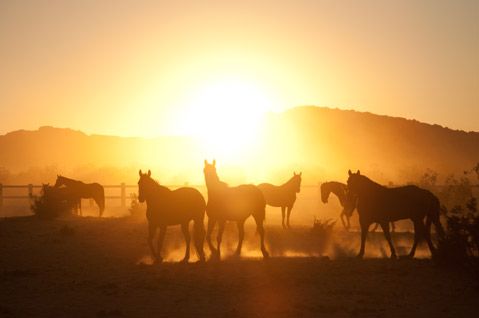Roaming Wild
Interview with Director Sylvia Johnson

For the past decade, the feds have spent more than $80 million rounding up the West’s wild horses in a scheme that no one thinks is working — government stables are packed, the cattle ranches are still overgrazed, and the remaining horses only seem to breed more. Meanwhile, much of America watches in horror as an iconic animal is removed from its home under the threat of eventual death. This doc tales an even-handed look at the issue.
How did you get involved in portraying this battle over an American icon?
I have always loved horses, and spent my teenage years riding and working on a ranch in Colorado. In 2009, I was invited by a friend to go to a BLM wild horse round-up in Wyoming and was completely blown away by what I saw. It was both one of the most spectacularly beautiful things I’d ever seen and also incredibly tragic. I went there with a lot of preconceived notions, but the more I talked to people, the more I realized that the issue was a lot more shades of grey than it was black and white. The story and the questions it raised stuck with me, so I started researching…and five years later, we have Roaming Wild.
For an issue with many passionate people on one side and a more practical mentality on the other side, the film manages to strike a respectful balance. Was that hard to achieve? How have the various interest groups reacted to the film?
It was very important to me that the film show the diversity of opinions on this issue. Most of the wild horse films I have seen are very one-sided, but the reality is much more nuanced and speaks to increasing pressures for development on arid Western lands. I worked hard to find characters that were interested in solutions, and the more time I spent with each of them, the more I felt like each side really has its valid points and so much could be gained from looking for innovative solutions and a middle ground rather than an “us vs. them” mentality. The film has been received very positively on all sides, which is encouraging to me that solutions really can be found.
Do the horse rescuers appreciate that something must be done, or would they like to see horses run free forever?
Horse rescuers run the gamut in terms of opinions, as do ranchers. There are certainly extremes on both sides and some wild horse activists believe that the horses should run free forever. In my experience, those that truly understand the issue get that the wildness of these horses is culturally important and represents an essential part of who we imagine ourselves to be as Americans, but also that in our modern world, it is not viable to have no management at all.
Will Americans ever recognize that horse can be eaten like Europeans, or are we too tied to its image?
I have a hard time imagining Americans ever being sold on the idea of eating horse meat. Horses — and particularly wild horses — symbolize much of the ideals that this nation stands for: freedom, independence, grace. Throughout the history of this country, they have been our companions, partners, and workers and the relationship between horse and man is in many ways considered sacred. I think the American public will continue to reject the idea of eating an animal that symbolizes so much and is so closely tied to our history and experience.
How is the fertility control working today?
Overall, fertility control really has not been implemented on a large scale or under the ideal conditions. We will be announcing some new developments for the possibilities of fertility control at the Santa Barbara International Film Festival.
Check the latest schedule here.



